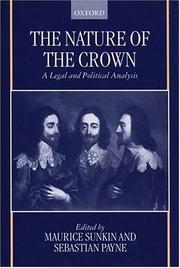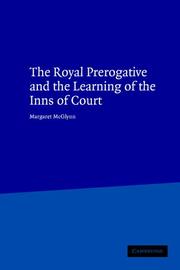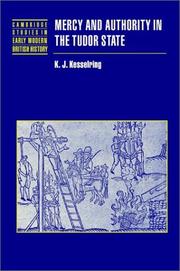| Listing 1 - 10 of 21 | << page >> |
Sort by
|
Book
Year: 2017 Publisher: FedOA - Federico II University Press
Abstract | Keywords | Export | Availability | Bookmark
 Loading...
Loading...Choose an application
- Reference Manager
- EndNote
- RefWorks (Direct export to RefWorks)
During the First World War, the parliaments of the states involved in the conflict were, in most cases, forced to drastically limit their activity and were often precluded the possibility of fully exercising their prerogatives. More generally the spaces of freedom granted to the citizens, of which the parliamentary institution was the brightest symbol, shrank dramatically. At the same time, the power of military commands expanded, not only in trenches and on battlefields, but also in many areas of civilian life. However, in the final years of the war, the Parliaments succeeded not only in gradually regaining control, but also in pushing for an extension of their functions, initiating a process that in many states coincided with the transition from a liberal order to a full democratic order. The years of the "long" postwar period were however dense with contradictions. Legislative and executive law often grew together, while in some cases the imperative logic imposed for a long time in wartime re-emerged and consolidated. This volume, which examines several national cases, illustrates some of the ambivalent features of this dramatic phase of European history.
Military Power --- Welfare State --- First World War --- Parliaments --- Royal Prerogative
Book
Year: 2017 Publisher: FedOA - Federico II University Press
Abstract | Keywords | Export | Availability | Bookmark
 Loading...
Loading...Choose an application
- Reference Manager
- EndNote
- RefWorks (Direct export to RefWorks)
During the First World War, the parliaments of the states involved in the conflict were, in most cases, forced to drastically limit their activity and were often precluded the possibility of fully exercising their prerogatives. More generally the spaces of freedom granted to the citizens, of which the parliamentary institution was the brightest symbol, shrank dramatically. At the same time, the power of military commands expanded, not only in trenches and on battlefields, but also in many areas of civilian life. However, in the final years of the war, the Parliaments succeeded not only in gradually regaining control, but also in pushing for an extension of their functions, initiating a process that in many states coincided with the transition from a liberal order to a full democratic order. The years of the "long" postwar period were however dense with contradictions. Legislative and executive law often grew together, while in some cases the imperative logic imposed for a long time in wartime re-emerged and consolidated. This volume, which examines several national cases, illustrates some of the ambivalent features of this dramatic phase of European history.
Military Power --- Welfare State --- First World War --- Parliaments --- Royal Prerogative
Book
Year: 2017 Publisher: FedOA - Federico II University Press
Abstract | Keywords | Export | Availability | Bookmark
 Loading...
Loading...Choose an application
- Reference Manager
- EndNote
- RefWorks (Direct export to RefWorks)
During the First World War, the parliaments of the states involved in the conflict were, in most cases, forced to drastically limit their activity and were often precluded the possibility of fully exercising their prerogatives. More generally the spaces of freedom granted to the citizens, of which the parliamentary institution was the brightest symbol, shrank dramatically. At the same time, the power of military commands expanded, not only in trenches and on battlefields, but also in many areas of civilian life. However, in the final years of the war, the Parliaments succeeded not only in gradually regaining control, but also in pushing for an extension of their functions, initiating a process that in many states coincided with the transition from a liberal order to a full democratic order. The years of the "long" postwar period were however dense with contradictions. Legislative and executive law often grew together, while in some cases the imperative logic imposed for a long time in wartime re-emerged and consolidated. This volume, which examines several national cases, illustrates some of the ambivalent features of this dramatic phase of European history.
Military Power --- Welfare State --- First World War --- Parliaments --- Royal Prerogative --- Military Power --- Welfare State --- First World War --- Parliaments --- Royal Prerogative
Book
ISBN: 0824031717 Year: 1978 Publisher: New York, NY : Garland,
Abstract | Keywords | Export | Availability | Bookmark
 Loading...
Loading...Choose an application
- Reference Manager
- EndNote
- RefWorks (Direct export to RefWorks)
Prerogative, Royal --- -34 <09> --- Royal prerogative --- Executive power --- Monarchy --- Divine right of kings --- Regalia --- Rechtsgeschiedenis --(algemeen) --- 34 <09> Rechtsgeschiedenis --(algemeen) --- 34 <09> --- Droit
Book
ISBN: 9782200613075 2200613075 Year: 2019 Publisher: Malakoff : Armand Colin,
Abstract | Keywords | Export | Availability | Bookmark
 Loading...
Loading...Choose an application
- Reference Manager
- EndNote
- RefWorks (Direct export to RefWorks)
Sous l'Ancien Régime, les rois de France mettent en place un appareil gouvernemental de plus en plus structuré, mobilisent des armées toujours plus nombreuses et accroissent la pression fiscale, donnant à croire qu'ils exercent un pouvoir absolu sur leurs sujets. Mais ils ne peuvent cependant pas faire tout ce qu'ils veulent. Dans un royaume divers, leur loi doit composer avec les nombreuses coutumes auxquelles les populations sont attachées. Certains de leurs projets se heurtent à des résistances importantes, ce qui les contraint à conclure des compromis, notamment dans les pays d'états qui conservent jusqu'au coeur du XVIIIe siècle une vitalité réelle. La plupart des institutions demeurent bien vivantes et si elles sollicitent les arbitrages royaux en matière de conflits de juridiction en un temps où la politique s'énonce en langage judiciaire, elles bataillent fermement pour défendre leurs attributions. C'est ce dialogue conflictuel entre le pouvoir central et le pays réel sur le plan institutionnel que ce manuel veut donner à comprendre : s'il s'est traduit par le passage d'une monarchie républicaine à un État royal, il permet aussi de comprendre, du fait des blocages qui sont intervenus, le déclenchement de la Révolution française. -- Quatrième
Prerogative, Royal --- Monarchy --- History --- France --- Politics and government --- Royal prerogative --- Executive power --- Divine right of kings --- Regalia --- Pouvoir royal --- Institutions politiques --- State, The --- Politique et gouvernement --- Prerogative, Royal - France - History --- Monarchy - France - History --- France - Politics and government - 1589-1789
Book
ISBN: 8490316732 9788490316733 9788490314913 8490314918 Year: 2013 Publisher: Madrid : Dykinson,
Abstract | Keywords | Export | Availability | Bookmark
 Loading...
Loading...Choose an application
- Reference Manager
- EndNote
- RefWorks (Direct export to RefWorks)
Coups d'état --- Prerogative, Royal. --- Gobierno. --- Royal prerogative --- Executive power --- Monarchy --- Divine right of kings --- Regalia --- Coup d'états --- Coups (Coups d'état) --- Government, Resistance to --- History --- Political science --- Revolutions --- Europe, Western. --- Europa. --- West Europe --- Western Europe

ISBN: 0198262736 9780198262732 Year: 1999 Publisher: Oxford Oxford university press
Abstract | Keywords | Export | Availability | Bookmark
 Loading...
Loading...Choose an application
- Reference Manager
- EndNote
- RefWorks (Direct export to RefWorks)
Prerogative, Royal --- Constitutional law --- Great Britain --- Kings and rulers --- -Prerogative, Royal --- -342.511.5 <41> --- Royal prerogative --- Executive power --- Monarchy --- Divine right of kings --- Regalia --- Constitutional limitations --- Constitutionalism --- Constitutions --- Limitations, Constitutional --- Public law --- Administrative law --- Interpretation and construction --- -Kings and rulers --- 342.511.5 <41> --- England --- Kings and rulers. --- Prerogative, Royal - Great Britain --- Constitutional law - Great Britain --- Great Britain - Kings and rulers

ISBN: 0521804299 0521187699 1107131006 0511179987 0511063709 0511306865 0511495420 1280419075 0511203969 0511072163 9780511063701 9780511179983 9780511072161 9780511495427 9780521804295 9780521187695 Year: 2003 Publisher: Cambridge, UK New York Cambridge University Press
Abstract | Keywords | Export | Availability | Bookmark
 Loading...
Loading...Choose an application
- Reference Manager
- EndNote
- RefWorks (Direct export to RefWorks)
Between the mid-fifteenth and mid-sixteenth century Prerogativa Regis, a central text of fiscal feudalism, was introduced into the curriculum of the Inns of Court, developed, and then abandoned. This 2003 book argues that while lawyers often turned their attention to the text when political and financial issues brought it to the fore, they sought to maintain an intellectual consistency and coherence in the law. Discussions of both substance and procedure demonstrate how readers reflected the concerns of their time in the topics they chose to consider and how they drew on the learning of both their predecessors and their peers at the Inns. The first study based primarily on readings, this book threw light on legal education, early Tudor financial and administrative procedure, and the relationship between the ways that law was made, taught and used.
Prerogative, Royal --- Feudal law --- Inns of Court --- History --- Royal prerogative --- Court, Inns of --- Droit féodal --- Feudalism --- Law, Feudal --- Law --- Executive power --- Monarchy --- Divine right of kings --- Regalia --- Bar associations --- Land tenure --- Law and legislation --- General and Others --- Inns of Court. --- History. --- Inns of Court School of Law

ISBN: 0521819482 0521037557 1107135796 0511121091 0511061560 0511330685 0511495854 128016249X 0511203020 0511070020 9780511061561 9780511121098 9780511070020 9786610162499 6610162492 9780521819480 9781107135796 9780511203022 9780511330681 9780511495854 9780521037556 Year: 2003 Volume: *38 Publisher: Cambridge Cambridge University Press
Abstract | Keywords | Export | Availability | Bookmark
 Loading...
Loading...Choose an application
- Reference Manager
- EndNote
- RefWorks (Direct export to RefWorks)
Using a wide range of legal, administrative and literary sources, this study explores the role of the royal pardon in the exercise and experience of authority in Tudor England. It examines such abstract intangibles as power, legitimacy, and the state by looking at concrete life-and-death decisions of the Tudor monarchs. Drawing upon the historiographies of law and society, political culture and state formation, mercy is used as a lens through which to examine the nature and limits of participation in the early modern polity. Contemporaries deemed mercy as both a prerogative and duty of the ruler. Public expectations of mercy imposed restraints on the sovereign's exercise of power. Yet the discretionary uses of punishment and mercy worked in tandem to mediate social relations of power in ways that most often favoured the growth of the state.
Tudor [Dynasty] --- Arts and Humanities --- History --- Power (Social sciences) --- Prerogative, Royal --- Monarchy --- Pardon --- Criminal justice, Administration of --- Executive power --- Amnesty --- Clemency --- Forgiveness --- Kingdom (Monarchy) --- Political science --- Royalists --- Royal prerogative --- Divine right of kings --- Regalia --- Empowerment (Social sciences) --- Political power --- Exchange theory (Sociology) --- Social sciences --- Sociology --- Consensus (Social sciences) --- Law and legislation --- Great Britain --- Politics and government
Book
ISBN: 1760461563 9781760461560 9781760461553 1760461555 Year: 2018 Publisher: ANU Press
Abstract | Keywords | Export | Availability | Bookmark
 Loading...
Loading...Choose an application
- Reference Manager
- EndNote
- RefWorks (Direct export to RefWorks)
The Australian Defence Force, together with military forces from a number of western democracies, have for some years been seeking out and killing Islamic militants in Iraq, Syria and Afghanistan, detaining asylum seekers for periods at sea or running the judicial systems of failed states. It has also been ready to conduct internal security operations at home. The domestic legal authority cited for this is often the poorly understood concept of executive power, which is power that derives from executive and not parliamentary authority. In an age of legality where parliamentary statutes govern action by public officials in the finest detail, it is striking that these extreme exercises of the use of force often rely upon an elusive legal basis. This book seeks to find the limits to the exercise of this extraordinary power.
War & defence operations --- Law --- Executive power --- Australia. --- Emergency powers --- Power, Executive --- Presidents --- Political science --- Implied powers (Constitutional law) --- Separation of powers --- Powers --- Australian Defence Force --- ADF --- Australian Defence Forces --- military law --- australian defence force --- executive power --- Commonwealth of Nations --- Martial law --- Royal prerogative --- The Crown
| Listing 1 - 10 of 21 | << page >> |
Sort by
|

 Search
Search Feedback
Feedback About UniCat
About UniCat  Help
Help News
News